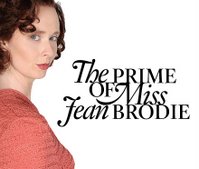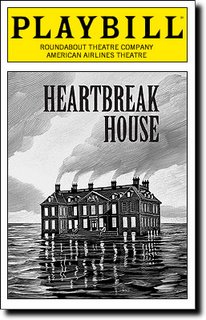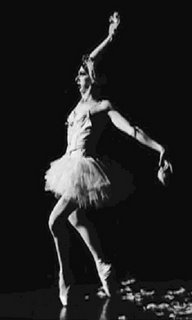 "Echoes" presented by Doubtless Dreamers at the 440 Studios, December 7, 2006
"Echoes" presented by Doubtless Dreamers at the 440 Studios, December 7, 2006N. Richard Nash wrote a couple of good plays and films during his long career, from "The Rainmaker" to its musical version "110 in the Shade," working with Tom Jones and Harvey Schmidt of "The Fantasticks" as well as collaborating with Kander and Ebb on "The Happy Time." A new revival of "110 in the Shade has been announced for the 2007 Broadway season presented by the Roundabout Theatre at Studio 54. It was also the Roundabout that last revived "The Rainmaker" starring Woody Harrelson, in 1999.
He also wrote "Echoes" in 1973, a cryptic sketch about two patients in a mental hospital. My conjecture is that he going for something like "One Flew Over The Cuckoo's Nest" from 10 years before, but didn't find a very good twist on the concept. It does not appear to have ever been given a major production. Having seen it, I understand why. The premise of two mentally ill patients who communicate well with each other, but cannot do so successfully with reality is a great idea for an acting exercise, one scene, maybe even a one-act. There's not enough here to justify a two-act evening. The imaginary world of these two require visualization of imaginary props and set pieces and makes the play much more affordable for a young company to produce. Again, a great acting exercise to hone up one's pantomime skills, but not 2 hours of great entertainment for an audience. There are a couple of other questions that I have about the premise that never get explained. First, is it customary in a mental ward to mix genders in a shared room? Particularly when we learn that he is married and has a child? Character reactions to major events also seem to be taken as a foregone conclusion - doesn't really gel with how I would expect a mentally ill person to respond. Things like that gnaw at me sometimes.
Craig Jessen and April Lowe have produced "Echoes" for themselves in a blackbox space also used during the annual NY Fringe Festival. The space works very well, with only two cots required on an otherwise empty stage. Mr. Jessen and Ms. Lowe are talented young actors. One can easily see the amount of effort and work that went into the staging of this production. As Tilda, Ms. Lowe carries the bulk of the heavy lifting since Mr. Jessen begins both acts while Sam is asleep. Paranoid and insecure, she spends her energy trying to make Sam (Mr. Jessen) happy in their cell. They go through their rituals of distraction and avoidance, but still run into their respective demons.
Fearing "The Person" their doctor (Kelly Morris) they withdraw and curl up every time he enters their cell. Mr. Morris has an equally difficult task of pantomiming speech. In the world Mr. Nash has created, the insane can only hear each other. It's a thankless role.
Mr. Jessen's Sam is a likeable guy, comforting and accomodating Tilda's insecurities. They've made a pact to NOT talk or listen to "The Person." They think they'll only be safe in their imaginary world of baseball and Christmas. Sam turns out to be either not as strong (or not as crazy) as Tilda and succumbs to the unheard words of his doctor. He clears his problems in a single (also pantomimed) conversation while Tilda rants and begs him not to. After promising to never leave Tilda, he does. She only whimpers and withdraws further.
From the program:
About Doubtless DreamersI wish them well on their journey.
Our mission is to entertain audiences while also promoting compassion. By exploring stories and characters that run the gamut of the human experience, we hope to create more empathy in the world.










